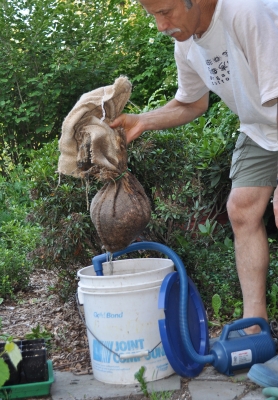COMPOST TEA: SNAKE OIL OR PLANT ELIXIR?
Is the Jury Still Out on Compost Tea?
In gardening, as in life, you can’t help but want to love some things, compost tea being one of them. After all, compost is good, tea is soothing, so what’s not to love about compost tea?
Perhaps it depends on how you brew your tea. Traditional compost tea was and is made by hanging a burlap bag of compost in water, then diluting and drenching the ground or the potting mix of a potted plant with the nutritious, coffee-brown liquid.
More recently, “aerated compost tea” (ACT) has soothed gardeners from coast to coast, the result mostly of the promotional efforts of soil scientist Dr. Elaine Ingham. This tea is brewed similarly to the traditional tea, except that extra foods, such as molasses (honey would seem more in keeping with the tea theme), brewers yeast, and bran, are also added, and — most important — the tea is aerated throughout the brewing process.
The soothing effect from ACT is not nutritional, but biological. You spray the tea on leaves or soil to spread beneficial microorganisms leached from the compost whose populations were beefed up by all that aeration and added nutrients. These happy microbes fight off attack by pathogens and insects, perhaps by making the offenders sick or unable to reproduce, perhaps by making the plants more healthy, or any one of a number of other hypothesized manners.
Coming from their home in the dark, moist, nutrient-rich innards of a compost pile, could these friendly microbes really be expected to survive on the bright, dry, nutrient-poor surface of a leaf? And evolutionarily-speaking, when would Mother Nature ever have made provisions for compost, let alone compost tea, let alone ACT microbes, to colonize a leaf and do good there? But this is all speculation; surely someone must have tested whether or not compost tea is really “soothing” to plant life.
How to Really Test Effectiveness
A slew of gardeners and farmers have tried ACT and can attest to its benefits. Matter of fact, a whole industry is dedicated to testing composts and compost teas, even selling compost tea brewers and compost tea itself.
The way to truly ascertain the efficacy of compost tea is to subject it to the same scientific scrutiny as you would anything else: Come up with a hypothesis (such as “Compost tea prevents powdery mildew of squash plants”) and then design an experiment to test the hypothesis. Said experiment would need both treated (compost tea sprayed) and control (water sprayed) plants. Most gardeners and farmers go to the trouble of spraying compost tea because they believe it will be effective, so are not willing to leave a portion of untreated (control) plants. Their endorsements, then, must be taken with a grain of salt, and the same must be said for endorsements from anyone reaping financial gain from compost tea.
One treated and one control plant, even one treated and one control plot of plants, would not be sufficient for a good test. Biological systems are complex. Grow 10 tomato plants under exactly the same conditions and some will grow a little more, some a little less than the others. With too few test plants, natural variations in plant growth might overwhelm variation due to a treatment. With enough plants to even out and offer a measure of natural variations in, say, plant growth, effects of a treatment are better parsed out.
And finally, randomization is needed to even out any effects of, say, location. Perhaps one side of a plot is more windy, or the soil is slightly different, or there’s a bit more sunlight. Rather than have all the treated plants cozied together growing better or worse because of this added effect, even out these effects by randomizing the location of treated and control plants.
Now you’ve got an experiment. Using a few arithmetic formulas or, these days, a computer program, you plug in the numbers and come up with a probability of an effect of the treatment. In agriculture, a 90% or 95% probability is usually considered sufficient. You can then answer “yea” or “nay” to the hypothesized question, in this example, “Does compost tea prevent powdery mildew of squash plants?” with a 90% or 95% confidence level
Okay, I’ll Try It
I have a friend who is a big proponent of compost tea. Finally, he convinced me to give it a try but only after I made him agree to supply me with a brewer, some compost, and explicit instructions, just to avoid his finding excuses for failure of the tea treatment.
A red flag went up when he advised me not to use it in my vegetable garden because it was “too organic.” I ended up, on his suggestion, spraying a few strips down my lawn and parts of some bean rows on a friend’s farms.
This admittedly nonscientific test conclusively showed no benefit at all from the tea.
Snake Oil, Mostly
So what’s the scientific verdict on compost tea? The answer is not so simple, in part because it depends whether the reference is to traditional compost tea or ACT, the kind of plant, the compost ingredients, how long the tea is brewed, how often tea is applied, etc.
Good experiments have been performed, from which the following general conclusions can be made: 1) ACT is not reliably beneficial (and often has a negative effect or spreads human pathogens such as Salmonella); 2) Traditional compost tea has been shown to be often but only mildly beneficial for root diseases; 3) If sufficiently, but not too, dilute, either ACT or traditional compost tea can supply nutrients to feed plants.
My pea plants succumb early every summer to some root disease, possibly fusarium. I am tempted to drench the soil for the peas with traditional compost tea. Perhaps I’ll even set it up as a crude experiment, keeping in the back of my mind the admonition of Charles Dudley Warner (My summer in A Garden, 1871), “I have seen gardens which were all experiment, given over to every new thing, and which produced little or nothing to the owners, except the pleasure of expectation.”
Mostly, though, I’ll continue to do what I’ve been doing, spreading compost on top of the ground and letting rainwater make the tea.



